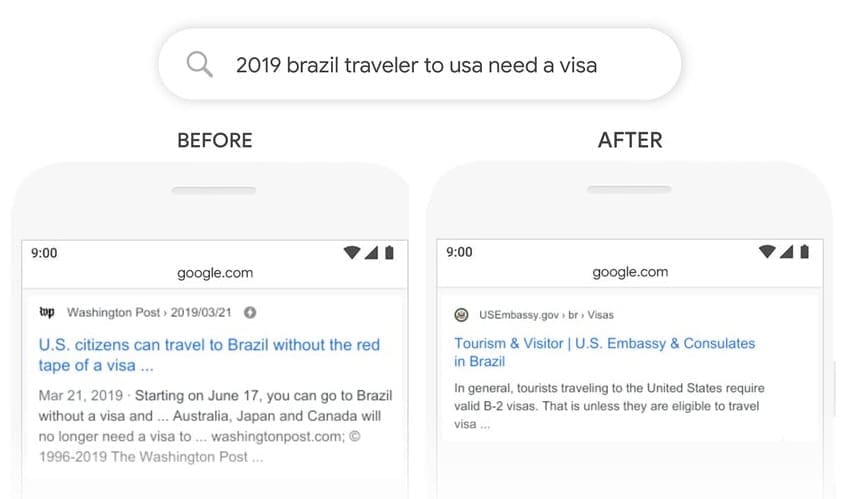
Boost your rankings and attract more customers through our SEO expertise.

When we last dived into the burgeoning promise of Google’s BERT AI, it was affecting only 10% of all English language searches. But Google always had ambitious plans for BERT’s expansion; plans that saw it roll out BERT across 70 languages in December 2019.
So, here we are just over a year since BERT got his big break. It’s time to take a peek under the hood to gauge exactly how much Google’s revolutionary AI has actually revolutionized search.
Although the meaning behind the acronym BERT is rather dry (Bidirectional Encoder Representations from Transformers), BERT is widely considered to be the single most significant search update Google has made since launching RankBrain back in 2015.
BERT’s goal is to better understand conversational language. It places special emphasis on important-but-often-ambiguous prepositions (such as “from” and “to”) that form the common building blocks of language but are notoriously difficult for computers to grasp.
Google showed us a live example of just how BERT has helped to improve the results based on the users search intent:

Here’s a search for “2019 brazil traveler to usa need a visa”. The word “to”and its relationship to the other words in the query are particularly important to understanding the meaning. It’s about a Brazilian traveling to the U.S., and not the other way around. Previously, our algorithms wouldn’t understand the importance of this connection, and we returned results about U.S. citizens traveling to Brazil. With BERT, Search is able to grasp this nuance and know that the very common word “actually matters a lot here, and we can provide a much more relevant result for this query.
In the same post, Google provided more examples of BERT helping them grasp the subtle nuances of language that computers have never been able to understand the way humans do:
Let’s look at another query: “do estheticians stand a lot at work”. Previously, our systems were taking an approach of matching keywords, matching the term “stand-alone” in the result with the word “stand” in the query. But that isn’t the right use of the word “stand” in context. Our BERT models, on the other hand, understand that “stand” is related to the concept of the physical demands of a job, and displays a more useful response.
Subscribe to our monthly newsletter.
Google announced last month that “BERT is now used in almost every query in English, helping you get higher quality results for your questions”. That’s a huge leap forward from this time last year when BERT only impacted 10% of English queries.

GIF: Google
Google has completed a hat-trick of AI introductions—RankBrain, Hummingbird, and now BERT—all of which share the same end goal of understanding language to provide users with the most relevant results. The emphasis is placed squarely on the user and providing them with high-quality content that matches their search intent. If that sounds familiar, it’s because that’s the same goal all good SEO practitioners have at heart.
As BERT continues to be rolled out across other languages and regions, site owners may start to lose more traffic. Why? Because the BERT-powered SERP is increasingly able to serve up results that answer users’ queries without any further clicking needed. This AI, in other words, finds the most relevant passage on the page and frames it as the answer—a feature that has come to be known as “passage indexing“.
Remember that less traffic is not necessarily a bad thing. Consider how a user may have searched for “how to exercise without going outside” before inadvertently clicking through to an article describing how outdoors exercise is more effective, then bouncing back from that page almost immediately. The kind of traffic lost due to BERT’s introduction was unlikely to convert anyway because certain, prominent search results never actually matched the searcher’s intent.
The best way to optimize for BERT is to ensure that your website content is well-written for a human audience (could this be the end of “spun” content that makes little sense?). If you do notice a significant drop in organic traffic, start by determining where the losses have occurred and investigate if BERT could be to blame. Still not sure? Check in with our SEO and Content Strategy teams: it’s time to create fresh, relevant content to answer your customers’ queries.
Boost your rankings and attract more customers through our SEO expertise.
Subscribe to our monthly newsletter.